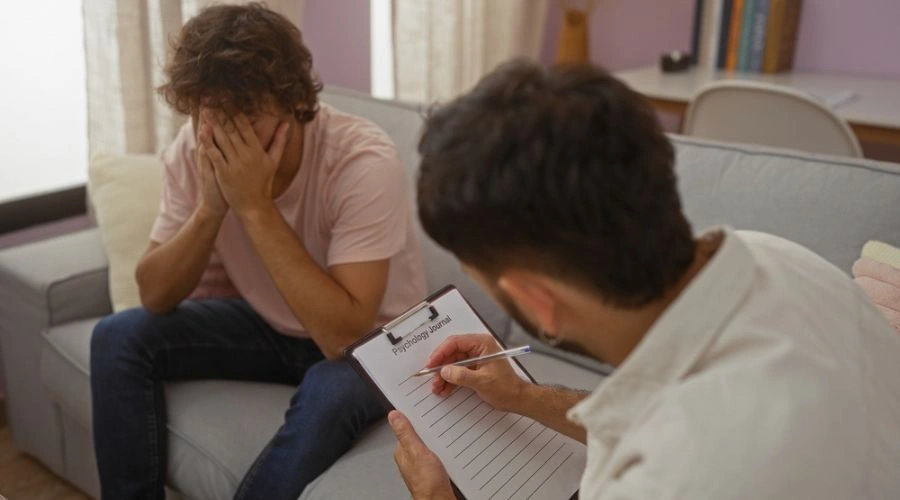Recover from Self-Harming Behaviors at Catalina Behavioral Health
Self-injury is rarely about physical pain. Often, it’s a reflection of emotional turmoil. People might self-harm to relieve emotional pain or distract themselves. Even though it may feel like it helps at the moment, those emotions eventually return.
Over time, this negative coping skill becomes your go-to when times get hard – but how do you stop when you’re ready?
Keep reading for guidance on effective programs for self-harm treatment and remember you can reach out to Catalina Behavioral Health to learn more about our self-harm rehab programs confidentially at any time.
Why Do People Self-Harm?

There is no single reason that people self-harm. Self-injury may come from a desire to be in control of intense emotions or wanting to punish yourself. Other times, it may be used to cope with emotional stress, in response to intrusive thoughts, or as a cry for help.
The reasons that people self-harm can shift with time. Sometimes, it’s also not clear why self-harming behaviors start.
Some risk factors for self-harm include social isolation, bullying, abuse, trauma, and sexual orientation. It’s most likely to start between ages 12-14.
Get Confidential Trauma and Mental Health Assessment
The Real Effects of Self-Harm
In the short term, self-harm causes pain. It might involve cutting or burning skin, scratching or rubbing skin until it breaks, or hitting yourself or things like walls. It can lead to abrasions, scars, or bruises.
Other types of self-harm involve not caring for yourself. Eating disorders like anorexia or bulimia and substance use disorders can also be considered a type of self-harm. Each of these conditions has long-term side effects of its own. For example, permanent scars, malnutrition, or poor health depending on how you self-harm.
Outside of physical risks, self-injury takes a serious toll on mental health that only gets worse as you isolate yourself from the people around you. Self-harming causes lower self-esteem, loss of confidence, and poor self-image. You might start to feel ashamed, guilty, or disgusted after the act.
These feelings and a desire to isolate make it hard to ask for help. That’s why Catalina prioritizes patient care, ensuring we offer a non-judgmental environment where the people who need it most can find help.
Is There a Link Between Self-Harm and Suicide?
It’s not uncommon for people who struggle with self-harm to also have suicidal thoughts or even attempts. Research shows approximately half of teens presenting with self-harm struggle with suicidal ideations. This does not mean that one causes the other, but they share similar risk factors. There’s also an increased risk of attempts in adolescents who use more than one form of self-injury.
How to Get Help for Self-Harm

Deciding that you’re ready to stop self-harming and make a change in your life is a big step that your future self will thank you for. Like with any mental illness, your success depends on things like your determination and the support that you have.
Finding Support
Having support in early recovery from self-harm is important. A good place to start is talking to a friend, family member, physician, counselor, nurse, or anyone else that you trust. Or, reach out to Catalina Behavioral Health in Tucson directly. We can guide you through the next steps of the recovery process.
Research Can I Get Help with Self-Injury at a Rehab Center?
Rehab facilities are a great place to seek treatment for self-injurious behaviors, especially treatment centers like Catalina, where we offer dual diagnosis and mental health care. Keep in mind this isn’t true for all rehab centers. Some specialize in addiction treatment without providing care for mental health concerns.
Choosing Between an Outpatient or Residential Treatment Center

At Catalina, we offer a variety of inpatient and outpatient options for self-harm treatment. Regardless of your schedule, insurance coverage, or other factors, we use an individualized approach that makes finding the support you need easy. Some of our offerings include alternatives to traditional outpatient therapy, including holistic residential and outpatient programs.
Benefits of a Residential Self-Harm Treatment Center
Inpatient treatment is ideal for people who are worried they may hurt themselves or who prefer intensive support from a self-harm treatment center. It’s also a good choice if you are struggling with an underlying mental health condition or substance use disorder. Co-occurring disorders are complicated to treat, but with the right support, recovery is possible.
Inpatient rehab is also a good choice if you are self-harming following a major life event or stress. It gives you a chance to physically be away from your problems while you start to heal.
Benefits of Outpatient Programs
Outpatient programs work well for people with lower support needs, who will still benefit from structure and multiple weekly sessions. During our intensive outpatient or partial hospitalization program, you’ll receive many of the same benefits of inpatient treatment while still being able to go to work/school and sleep in your bed.
Catalina also offers intensive outpatient programs for adult and adolescent clients. Our teen clients feel comfortable when they come to Catalina to seek self-harm treatment because our adolescent group is separate. Teens participate in group therapy with their peers, surrounded by people who reinforce the idea that they are not alone.
What Help at a Self-Harm Treatment Center Looks Like

With our personalized approach, self-harm treatment looks a little different depending on your needs. Our holistic approach typically involves psychiatry, client-centered therapies, group counseling, recreational therapies, and healthy habit-building.
Mental Health Disorders with Self-Harm as a Symptom
It is possible to receive a diagnosis for self-injury. On their own, self-harm behaviors are diagnosed as nonsuicidal self-injury disorder. Other times, self-harm is a symptom associated with one of these mental health disorders:
- Depression
- Anxiety
- Sleep disorders
- Bipolar and other mood disorders
- Personality disorders including borderline personality disorder
- Dissociative disorders
- Obsessive-compulsive disorder
- Post-traumatic stress disorder
- Destructive, impulse control disorders including intermittent compulsive disorder and conduct disorder
- Autism
- Substance use disorders
- Eating disorders
Receiving a proper diagnosis is a great first place to start in understanding self-harm, your triggers, and how to overcome them.
Get Accredited Treatment Programs at Catalina
Psychiatry and Medication Management
Many people who struggle with self-injury have an underlying mental health problem, behavioral health problem, or unresolved trauma. Diagnosis and proper treatment of these conditions are an essential part of the recovery process.
For people who have an underlying mental health condition, treatment is an important part of long-term recovery. At Catalina, you’ll work with a mental health professional to manage symptoms like depression, anxiety, insomnia, and emotional instability. Medication support might be temporary or ongoing, depending on individual needs and progress with treatment.
Individual Counseling
Our clients often say they feel comfortable working with our compassionate staff. As you share more about your daily life and emotional struggles, they’ll help you identify underlying reasons you may self-harm. As you recognize triggers, you’ll be able to implement coping strategies when you feel urges coming on.
Individual therapy might involve a variety of techniques, with cognitive behavioral therapy (CBT) and dialectical behavior therapy (DBT) being considered the “gold standard”. These might be combined with other approaches, including family therapy and group counseling.
Dialectic behavioral therapy is effective in alleviating self-harm influenced by depressive symptoms. DBT aims to treat self-harm using distress tolerance, mindfulness, emotional regulation, and interpersonal relationships.
CBT helps change behaviors like self-harming by changing how you react to thoughts and emotions. You’ll also work to recognize unhelpful negative thinking patterns and shift them.
Group Therapy

When you struggle with self-harm, it’s easy to feel isolated. Group counseling sessions at Catalina let you connect with your peers. You can share parts of your recovery journey, share coping strategy ideas, and practice social skills.
Certain skills in DBT are also taught in a group setting. During DBT group sessions, you might do exercises, have homework, and share examples of how to apply DBT coping skills to real life.
Recreational Therapies
Experiential therapies include things like physical activity, meditation, yoga, art therapy, and music therapy. They provide a healthy outlet for emotions, offering healthy ways to manage feelings without harmful behavior. Recreational activities also provide a healthy distraction when you are struggling with urges to self-harm.
Mindfulness and relaxation techniques can also teach you to reduce the intensity of your feelings. Your emotions and thoughts begin to have less power.
Up To 100% of Rehab Costs Covered By Insurance
Healthy Habit Building
One thing that clients in self-harm treatment learn is that taking care of yourself is an important part of self-care. This looks like good hygiene, getting enough sleep, drinking enough water, and eating a nutrient-dense diet.
Healthy habits also involve a good morning routine that sets the tone for your day, keeping up with appointments, and following your treatment plan. Spend time outdoors when you can, be physically active, and make time for things you enjoy.
All these things benefit mental health, self-image, and overall well-being. With a better mindset, it’s easier to use healthy coping strategies, manage stress, and overcome impulses to self-harm. You’ll feel more confident in taking control of your emotions and your life.
Take Control of Your Mental Health at Catalina Behavioral Health

Catalina Behavioral Health in Tucson, Arizona is more than an addiction treatment center. We also offer mental health help, including treatment for self-harm habits and co-occurring disorders.
The tools learned at Catalina set clients up for lasting success in their recovery. You’ll deep dive into triggers and coping skills, receive mental health help, and participate in holistic therapies that promote mental wellness and overall health.
Treatment is better at Catalina – give us a chance to show you why. Reach out today with questions about our treatment programs, insurance coverage, or how to start your recovery from self-harm.





